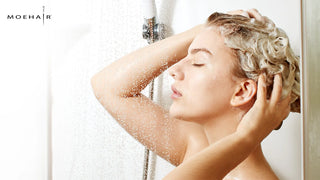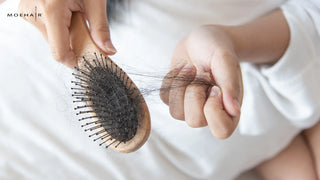 Table of contents
Table of contents
Picture this: you’re standing in the shower, staring at a clump of hair tangled in your fingers. Panic sets in. “Am I losing too much hair? Should I switch shampoos?” Hair fall can be overwhelming, but you’re not alone. For many, searching for an anti-hair fall shampoo feels like hunting for a magic potion. But how does this shampoo work, what ingredients should you look for, and is it really effective? Let’s find out.
How does anti-hair fall shampoo work
Anti-hair fall shampoos address specific factors contributing to hair thinning and breakage. Justine Marjan, a celebrity hairstylist, explains, “Some thickening shampoos contain properties that make the hair 'swell' so that it feels plumper and fuller when styling, whereas others target the scalp with nourishing ingredients that stimulate the follicles to increase hair growth and density.” Simply put, the best shampoo for hair loss is the one that not only gives volume but also nurtures your hair from root to tip. Here’s how it works:
- Nourishes and protects: Just like your skin needs hydration, your hair needs nourishment. Anti-hair fall shampoos often contain vitamin E, zinc, and antioxidants to keep the mane healthy and balanced. They also protect against environmental stressors like pollution, which can weaken hair over time.
- Strengthens hair strands: It helps reinforce the hair shaft, making strands less vulnerable to breakage. Regular use of anti-hair loss shampoo supports the growth of thicker and healthier hair by resisting the stress that leads to shedding.
- Boosts scalp health: According to Brendan Camp, MD, from MDCS Dermatology, “Hair growth shampoos work by improving the health of your scalp.” They soothe irritation, reduce inflammation, and promote blood circulation. They also clean the scalp and keep your follicles clear of oils and buildup.
- Stimulates hair growth: The best shampoo for hair loss reinforces roots and follicles, waking them up from their dormant phase and promoting fresh growth. So, not only are you stopping existing hair from falling out, but you’re also giving new hair the chance to sprout!
Key ingredients to look for
Not all shampoos are created equal, and the magic lies in the ingredients. Here are the ingredients you need in your anti-hair loss shampoo:

- Keratin – Think of it as armor for your hair, protecting it from external damage. It is a protective protein that helps smooth hair cuticles, control frizz, and boost manageability.
- Ginseng – Its root extract can increase the number of dermal cells on your scalp, promoting a healthy hair growth cycle. The active compound in ginseng, known as ginsenosides, strengthens roots and follicles.
- Lupine Protein – It is a plant-based peptide solution that delays the onset of hereditary hair loss. It stimulates tissue oxygenation and offers revitalizing benefits, adding volume, thickness, and softness.
- Natural Oils – Argan, avocado, and safflower seed oil help replace lipids lost to chemical treatments. These nourishing elixirs promote cell production, soothe scalp conditions, and prevent breakage.
- Saw Palmetto – This is a small palm tree that grows in the US. It exhibits anti-inflammatory effects that prevent some types of hair loss. It is a natural DHT blocker, perfect for tackling hormonal hair loss.
Now, here’s the catch: Ingredients alone don’t guarantee everything. You need the right formula for your unique hair type and concerns. Indulge in regular cleansing with Moehair Hair Guard Shampoo, which contains these proven ingredients and boasts a science-backed composition suitable for all hair types. It is a potent anti-hair fall shampoo that works equally well on both natural and processed hair.
How to choose the best shampoo for hair loss
Imagine walking into the store with shelves lined with shampoos, each promising the world. How do you pick one? It all starts with understanding your scalp and hair’s needs.
- Oily scalp – If your hair feels greasy by the end of the day, you may need to use a clarifying shampoo with tea tree oil or salicylic acid occasionally. These ingredients keep oil in check without drying out your scalp.
- Dry, flaky scalp – Hydration is your best friend. Look for soothing ingredients like glycerin, aloe vera, and shea butter. These components not only nourish your scalp but also fortify it against damage.
- Thinning hair – Products with biotin, caffeine, or saw palmetto can give your roots and follicles a much-needed boost. They unclog pores and enhance moisture retention, making hair less prone to breakage.
- Underlying causes – Hair loss due to hormonal imbalance may benefit from shampoos with DHT blockers, while stress-related hair loss might require nourishing formulas.
How to use anti-hair fall shampoo
Most people don’t use anti-hair loss shampoo correctly. Yes, there’s a right way to wash your hair if you want the best results.

- Pre-wash prep – Gently detangle your hair before shampooing to minimize mechanical breakage.
- Start with lukewarm water – Hot water might feel relaxing, but it strips your scalp of natural oils. Use lukewarm water to open up the cuticles.
- Focus on the scalp – Your scalp is where the magic happens, so spend time massaging the shampoo in. This improves blood circulation and allows the active ingredients to penetrate.
- Rinse thoroughly – Leftover shampoo can clog follicles and weigh your hair down. Make sure to rinse until the water runs clear.
- Condition wisely – Apply conditioner only to the mid-lengths and ends of your hair. Avoid the scalp to prevent oil buildup.
Avoiding the common pitfalls
Even the best shampoo for hair loss won’t work if you make these mistakes:
- Do not overuse it! Washing your hair daily can strip it of natural oils. Stick to 2-3 washes a week unless you have a very oily scalp.
- Do not skip the conditioner! Neglecting this step can leave your hair dry and prone to breakage.
- Do not use too much of the product! A little goes a long way. Overloading your scalp with shampoo or conditioner can lead to buildup.
FAQs
Q1. What is the best shampoo for treating hair loss?
Moehair Hair Guard Shampoo is the best shampoo for hair loss that helps strengthen, nourish, and revitalize your hair. It is specially formulated to reverse breakage, promote scalp health, and support new hair growth.
Q2. How do I choose shampoo for hair loss?
You can choose the best shampoo for hair loss by considering its ingredients, such as natural oils, ginseng, proteins, and more.
Q3. How often should I use anti-hair loss shampoo?
Depending on hair type and texture, most hair growth shampoos can be used 2-3 times weekly.
Q4. Are there any side effects of anti-hair fall shampoo?
Certain ingredients in anti-hair loss shampoos may cause mild scalp irritation. If you have a known allergy or scalp condition, consult your trichologist before using a new product.
References
https://www.realsimple.com/best-hair-thickening-shampoos-7152410
https://www.medicalnewstoday.com/articles/68082
https://www.health.com/beauty/hair/best-shampoos-for-hair-growth
How we reviewed this article:
Our experts continually monitor the fashion and beauty space, and we update our articles when new information becomes available.
-
Current Version
-
Dec 20, 2024
Written By -
Saloni Sachdeva is a lifestyle writer with 5+ years of experience in writing in the beauty and haircare industry.
Edited By -
Saima Ahmed with 8+ yrs of experience, specializes in crafting engaging content focused on Hair care, lifestyle, and beauty.























